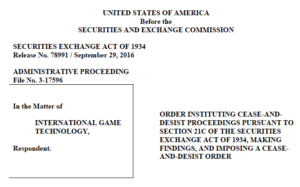The Commission’s First Stand-Alone SEC Whistleblower Retaliation Case
On September 29, 2016, the U.S. Securities and Exchange Commission (the “SEC” or “Commission”) brought an action against International Game Technology (“IGT”) for retaliating against an employee whistleblower. This was the first stand-alone SEC whistleblower retaliation case brought by the Commission since the SEC whistleblower program began in 2010. While the SEC’s Order against IGT mentioned the whistleblower’s allegations of substantive securities law violations, it did not reveal one way or the other whether the SEC agreed with those allegations or found them to have merit. The sanctions pertained strictly to IGT’s acts of SEC whistleblower retaliation.
The SEC Order
The Whistleblower’s Employment History With IGT
According to the Commission’s Order, the SEC whistleblower worked at IGT for approximately six years. He had consistently received positive performance evaluations, and had been promoted to the position of director of a division with a spending budget of over $700 million. He had never been formally disciplined by IGT. Nor had he ever received any corrective action or correction memo. The bonuses and grants that he received were at or near the highest levels awarded for his division. His immediate supervisor ranked the whistleblower as his top employee and projected him as a potential future vice-president of the company. His supervisors even sought authorization to pay him a special retention bonus to keep him with IGT.IGT Engages In SEC Whistleblower Retaliation
According to the SEC’s Order, the whistleblower discovered some accounting issues that he believed could result in inaccuracies in IGT’s financial statements. He gave a presentation about it to his supervisors. Shortly thereafter, one of the whistleblower’s supervisors “recommended to two vice presidents that the Whistleblower be terminated”. A few days later, that same supervisor told IGT’s CEO “that he would terminate the Whistleblower”. The next day, the whistleblower submitted a complaint to IGT’s internal grievance hotline, in which he apparently explained the accounting issues. The complaint prompted IGT’s human resources department to instruct the supervisor to put a “hold” on his plan to terminate the whistleblower’s employment. IGT hired outside counsel to conduct an internal investigation. On or about the same time, the whistleblower reported the potential securities law violations to the SEC. The SEC’s Order states that while the internal investigation was going on, IGT removed the whistleblower from a project that he was working on, and instructed him not to attend an annual industry convention that he had attended in prior years. At some point during the internal investigation, the employee informed IGT that he had blown the whistle to the SEC. Approximately seven weeks later, the internal investigation concluded that the whistleblower was wrong, and that the accounting and financial statements were correct. IGT terminated the whistleblower’s employment.
The SEC’s press release
SEC Officials Commit To Enforcing Prohibitions On SEC Whistleblower Retaliation
The SEC found that IGT violated the rules prohibiting SEC whistleblower retaliation contained in Section 21F(h) of the Securities Exchange Act of 1934. According to the SEC’s Order, that Section:… prohibits an employer from discharging, demoting, suspending, threatening, harassing, directly or indirectly, or in any other manner discriminating against, a whistleblower in the terms and conditions of employment because of any lawful act done by the whistleblower in, among other things, providing information regarding potential violations of the securities laws to his employer or to the Commission.
The SEC ordered IGT to pay a civil monetary penalty of $500,000. In the SEC’s press release about the case, the Director of the SEC’s Division of Enforcement asserted, “Strong enforcement of the anti-retaliation protections is critical to the success of the SEC’s whistleblower program”. The Chief of the SEC’s Office of the Whistleblower added, “Bringing retaliation cases, including this first stand-alone retaliation case, illustrates the high priority we place on ensuring a safe environment for whistleblowers”. She further emphasized that the SEC “will continue to exercise our anti-retaliation authority when companies take reprisals for whistleblowing efforts”.Additional Information
For additional information about the SEC’s enforcement of rules prohibiting SEC whistleblower retaliation, click on the links below:- The SEC’s Order in the IGT case. (External link to the SEC’s website.)
- The SEC’s Press Release about the IGT case. (External link to the SEC’s website.)
- Article about the IGT case. (Note: external link to The Pickholz Law Offices website.)







